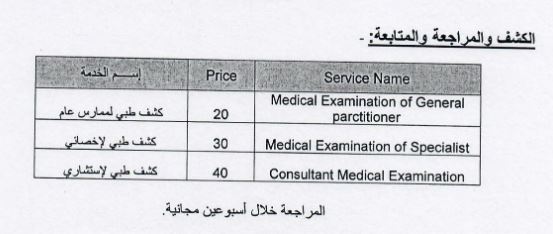Minister of Economy and Trade Mohamed Hwej issued Resolution No. 401 of 2022 to set the new ‘‘indicative’’ prices for medical services, calling on clinics and medical laboratories to provide first aid for emergency cases – before demanding payment.
The new resolution also prescribes those medical facilities publish their prices in the clear view of customers.
The price list published by the Ministry is lengthy covering a wide range of medical services and included the price GPs, specialists and consultants should charge for a consultation.
GPs are to charge LD 20 (US$ 4.40) per visit
Specialists are to charge LD 30 (US$ 6.60) per visit
Consultants are to charge LD 40 (US$ 8.80) per visit
Analysis
The Libyan private sector has been waiting and patiently looking forward to the Libyan state to reform the health sector – as it has purported for years.
The new medical services price list announced by the Economy Ministry will come as a huge disappointment. It continues the ‘‘lowest common denominator’’ outlook by successive governments going back to the Qaddafi era. It sends the message that the government is still wearing Qaddafi era welfare state spectacles.
It flies in the face of all the pro-private sector pronouncements made by Economy Minister Hwej at several events and podiums since his appointment to his post by incumbent Caretaker Prime Minister Aldabaiba.
Setting ludicrously low prices for medical services, in complete isolation from economic reality is not going to help improve the Libyan health sector. Prices must be real and must reflect the cost of living and of doing business in Libya. Least of all, they must reflect the current LD exchange rate at LD 4.45 per US dollar.
They must also have some bearing to the prices set by countries most visited by Libyans for healthcare, such as Tunisia, Turkey, Jordan etc.
Disincentive for Libyan doctors abroad
Setting such low prices will not encourage the thousands of Libyan doctors abroad to return to Libya and work in the sector.
Disincentive for Libyan investors
Setting such low prices will not create a private sector local health services sector. It will not encourage Libyans to invest in the sector.
Disincentive for foreign investors
Setting such low prices will certainly not encourage foreign investors into Libya’s health sector. FDI expects a return on investment that they can achieve in other countries.
Bleeding of Libya’s fast diminishing hard currency
Setting such low prices will mean that Libya will continue to have a poor health sector. This will also continue to drive patients abroad and will continue to bleed Libya’s hard currency to foreign health sectors such as Tunisia, Turkey, Jordan etc.
Setting low prices is not helping the poor
Setting such low health prices will mean there will be two layers of Libyans. There will be those who can afford good health care abroad and the majority who cannot get the more expensive and more often better health service abroad. Most low-income Libyans will be handcuffed to low cost, poor healthcare in Libya.
Lowe prices do not always help those with lower income when it comes at the cost of their health.
Post the Qaddafi era, the new state must unshackle itself from the old thinking and allow market forces to set prices and wages. Centralized price setting has proven a failure since the eastern bloc and Soviet union days.








